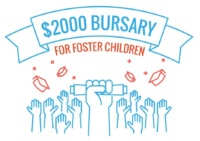The struggle of gaining adequate education is ever-present in many foster children’s lives, and often leads to complications obtaining employment after they have exited the foster care system. When a young person “ages out” of care, they lose access to many of the supports available through the child welfare system. While that age varies between provinces and territories, aging out usually occurs between the ages of 18-21. Once a young person reaches that age, they are expected to live as independent adults, with only limited supports available to them.
Many young people leaving foster care do not have the same educational and employment opportunities as their contemporaries, leading to an employment rate 20% less than their peers. This lack of formal employment contributes to the risk of homelessness. Without a stable source of income, some former foster youth struggle with food security and long-term housing stability.
For every 1,000 youths in Canadian foster care, only eight go on to graduate with a post-secondary education. One of the largest barriers to entry for children in foster care is the financial burden that comes along with post-secondary education.
In response to the growing number of foster children and youth in care that struggle to afford post-secondary studies, Storwell has developed the Storwell Foster Children Bursary Program. Along with providing accessible and affordable self-storage units, Storwell is also devoted to helping out the local community through various charitable causes and social initiatives.
For over a decade, Storwell has been running the bursary program for students who were part of the foster care system to help them attend post-secondary school. The aim of the bursary is to provide foster children with resources and opportunities that might be otherwise unavailable to them. With the proper tools, these students can work towards building a better life for themselves through the pursuit of higher education.

